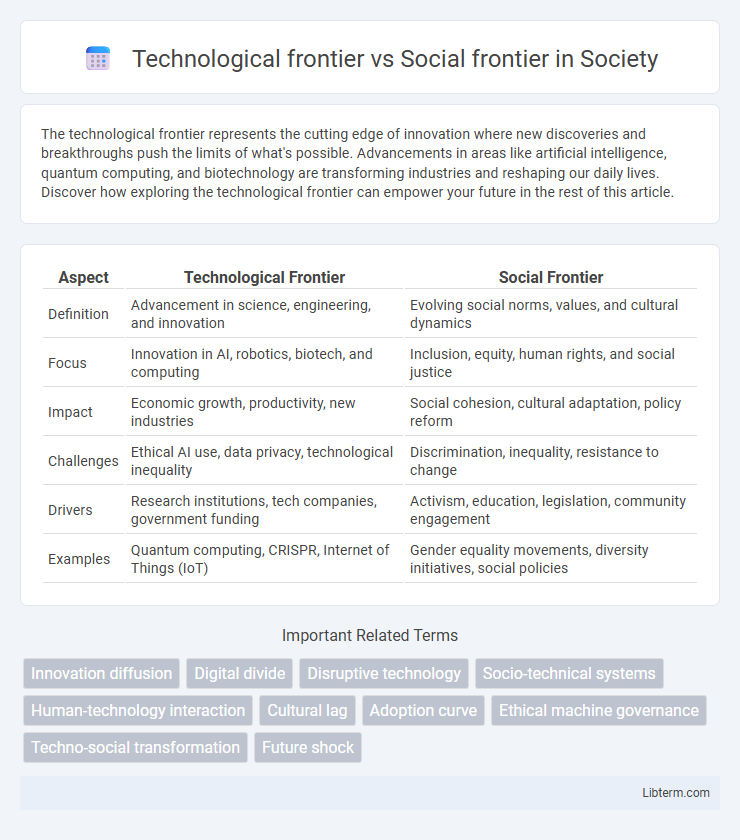The technological frontier represents the cutting edge of innovation where new discoveries and breakthroughs push the limits of what's possible. Advancements in areas like artificial intelligence, quantum computing, and biotechnology are transforming industries and reshaping our daily lives. Discover how exploring the technological frontier can empower your future in the rest of this article.
Table of Comparison
| Aspect | Technological Frontier | Social Frontier |
|---|---|---|
| Definition | Advancement in science, engineering, and innovation | Evolving social norms, values, and cultural dynamics |
| Focus | Innovation in AI, robotics, biotech, and computing | Inclusion, equity, human rights, and social justice |
| Impact | Economic growth, productivity, new industries | Social cohesion, cultural adaptation, policy reform |
| Challenges | Ethical AI use, data privacy, technological inequality | Discrimination, inequality, resistance to change |
| Drivers | Research institutions, tech companies, government funding | Activism, education, legislation, community engagement |
| Examples | Quantum computing, CRISPR, Internet of Things (IoT) | Gender equality movements, diversity initiatives, social policies |
Defining the Technological Frontier
The technological frontier represents the cutting-edge innovations and breakthroughs that push the limits of current scientific and engineering capabilities, enabling new products, processes, and services. It involves continuous research and development in fields such as artificial intelligence, biotechnology, and quantum computing, driving economic growth and competitive advantage. Defining the technological frontier requires identifying emerging technologies, measuring their adoption rates, and assessing their potential to transform industries and societies.
Understanding the Social Frontier
Understanding the social frontier involves exploring human interactions, cultural evolution, and societal challenges that shape collective behavior and values. Advances in social sciences and digital communication technologies enhance insights into social dynamics, equity, and cohesion, driving policy and innovation for inclusive progress. Addressing the social frontier requires integrating interdisciplinary research with ethical frameworks to foster resilient communities and sustainable social development.
Intersections Between Technology and Society
The intersections between technological frontiers and social frontiers highlight how advancements like artificial intelligence and biotechnology reshape societal norms, ethics, and governance structures. Technological innovations drive shifts in labor markets, communication methods, and privacy concerns, necessitating adaptive social policies and education systems. Understanding these dynamics is essential for managing the co-evolution of technology and society to ensure equitable and sustainable development.
Drivers of Technological Advancement
Rapid innovation in artificial intelligence, quantum computing, and biotechnology serves as primary drivers of the technological frontier, enabling breakthroughs that redefine industry standards and economic growth. Investment in research and development, supported by global collaboration and robust intellectual property protections, accelerates the pace of technology adoption and diffusion. Technological advancement is often propelled by the convergence of multidisciplinary expertise and cutting-edge infrastructure, surpassing traditional limitations of productivity and creativity.
Social Change in the Digital Era
Social change in the digital era is driven by the rapid adoption of digital technologies that reshape communication, social interactions, and cultural norms. The social frontier addresses challenges such as digital inclusion, data privacy, and the impact of social media on public discourse, influencing societal structures and behaviors. Unlike the technological frontier focused on innovation and hardware development, the social frontier emphasizes human-centric adaptations and ethical considerations in digital transformation.
Ethical Challenges at the Frontiers
Technological frontiers introduce cutting-edge innovations such as artificial intelligence and gene editing that raise ethical challenges including privacy concerns, informed consent, and potential biases in algorithmic decision-making. Social frontiers reveal evolving norms around equity, justice, and human rights, demanding ethical frameworks that address inclusivity, systemic discrimination, and the societal implications of new technologies. Navigating the ethical challenges at both frontiers requires interdisciplinary collaboration to balance technological advancement with social responsibility and moral accountability.
Innovation and Social Adaptation
Technological frontier innovation drives breakthroughs in artificial intelligence, biotechnology, and renewable energy, rapidly reshaping industries and economic models. Social frontier adaptation requires evolving cultural norms, education systems, and policy frameworks to integrate these advancements successfully and reduce disparities. Balancing cutting-edge technology deployment with inclusive social change ensures sustainable progress and broad societal benefits.
Bridging the Gap: Collaboration Between Tech and Society
Bridging the gap between the technological frontier and social frontier requires strategic collaboration to ensure innovations address societal needs and ethical considerations. Integrating diverse stakeholder perspectives, including policymakers, developers, and community members, fosters responsible technology adoption and mitigates digital divides. Effective partnerships drive inclusive progress by aligning technological advancements with social equity and cultural values.
Measuring Progress: Technology vs Social Wellbeing
Measuring progress on the technological frontier involves quantifying advancements through metrics such as innovation indices, patent counts, and GDP growth driven by technology sectors. In contrast, assessing social wellbeing on the social frontier relies on indicators like the Human Development Index, quality of life surveys, and access to healthcare and education. Balancing these measurements offers a comprehensive view of societal development beyond mere technological achievements.
Shaping the Future: Harmonizing Both Frontiers
Shaping the future requires harmonizing the technological frontier, which drives innovation in AI, biotechnology, and renewable energy, with the social frontier focused on ethics, equity, and human well-being. Integrating advancements in machine learning and smart infrastructure with inclusive policies ensures sustainable development and societal resilience. Collaborative efforts between technologists, policymakers, and communities foster balanced progress that addresses both digital transformation and social impact.
Technological frontier Infographic

 libterm.com
libterm.com